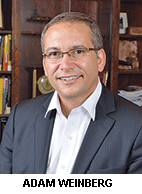Although America’s universities are globally acclaimed for the academic, co-curricular and sports education they provide to 20.5 million students, including almost a million from overseas, the role they play in developing the civic responsibilities of students is not so well known. But this is an important role for this country’s 4,726 universities. Universities in the US have long been committed to educating thoughtful, knowledgeable and discerning future leaders and members of society. A university education helps students develop civic agency, defined as the skills, values and habits needed to work effectively with others to act on common problems across differences. Universities also contribute to the common good as important social institutions whose activities and resources create stronger communities.
 The civic work of higher education in the United States rests on five pillars.
The civic work of higher education in the United States rests on five pillars.
First, students are immersed in classrooms that provide them solid grounding in the skills, values and disciplines of the liberal arts. In his classic essay ‘Only Connect,’ environment historian William Cronon writes that liberally educated individuals are excellent communicators with developed listening, comprehension and speaking skills. They also can write persuasively, solve a wide range of problems, and respect rigour as a way of seeking truth. They also tend to practice respect and humility, understand how to get things done and nurture and empower people around them. Whatever disciplines students study, they need to leave universities with these baseline skills, habits and values with which they will contribute to the societies in which they live.
Second, America’s great universities are laboratories for practicing democracy. They attract a diverse mix of students from around the world, offer robust environments for students to learn how to work cooperatively across differences of culture, religion, ethnicity and become problem-solvers and engaged citizens. They learn to build sustainable, harmonious communities.
America’s best universities have learned to transform their campuses into laboratories for this type of learning. Students in residential halls learn to live and work with a wide cross-section of people, and harmonise different voices and views to create resilient communities. Likewise, student organisations become sites for learning the language of civic opportunity and public work. At Denison, we host more than 160 student organisations.
Third, America’s great universities also teach the community to connect in addressing local issues. In the US, most colleges host community engagement centres that prompt students to become engaged with local communities by way of service and humanitarian outreach. Over the past decade, more progressive universities have introduced service-learning programs which blend academic work with community engagement. For instance in Denison University, the Alford Centre for Service Learning supports more than 600 students every year as they interface with people in the town of Newark, about five miles from our campus. Our students have a long tradition of partnering with local community organisations to whom they provide support through research and volunteerism.
Simultaneously, our faculty are conducting community-based research and service learning classes. For example, an education course on literacy and learning exposes students to theories of literacy even as they work in inner city elementary schools to help students with disabilities to learn to read. Thus, students put theory into practice and, in doing so, help an elementary school develop a program that serves at-risk children.
Fourth, most US universities prepare students for success in their personal, professional and civic lives.
Students crave jobs that matter. For some, this means transformation into social entrepreneurs, or promoting small-scale NGOs or signing up with companies that contribute to the social good. For others, it means learning to work as professionals — doctors, lawyers, financial investors — with civic interests. And for some students, it’s about working for large companies taking on global issues. Progressive liberal universities create pathways for students to enable them to build lives and careers that blend their personal and professional lives with civic interests and responsibilities.
And finally, America’s best universities are civically engaged institutions which build strong local communities. This is tougher than it seems. Do we operate in ways that strengthen local businesses? Do we encourage our faculty and staff to participate in local civic life? How do we respond when faculty, staff or students take public stands that may or may not benefit the university?
Universities can be — and should be — engines of social progress. For this to happen at the scale our communities need, universities have to be committed to all of the five pillars of civic engagement outlined above.
Much of this work is focused on students, helping them develop civic agency. But the work extends beyond this, as universities harness the power of faculty, teaching and research, while also operating as social institutions whose policies and practices model civic action and improve local civic capacity and capabilities.